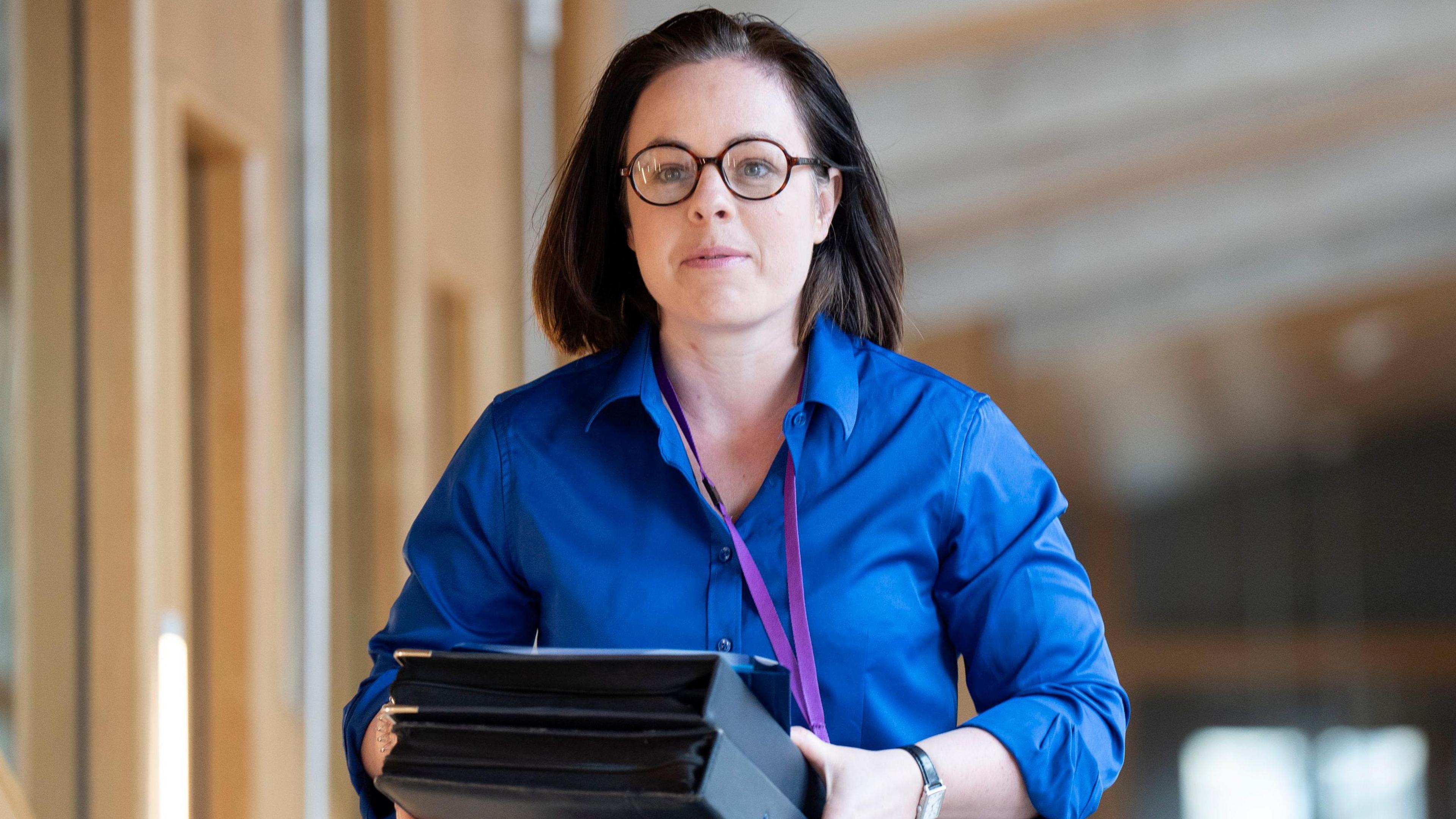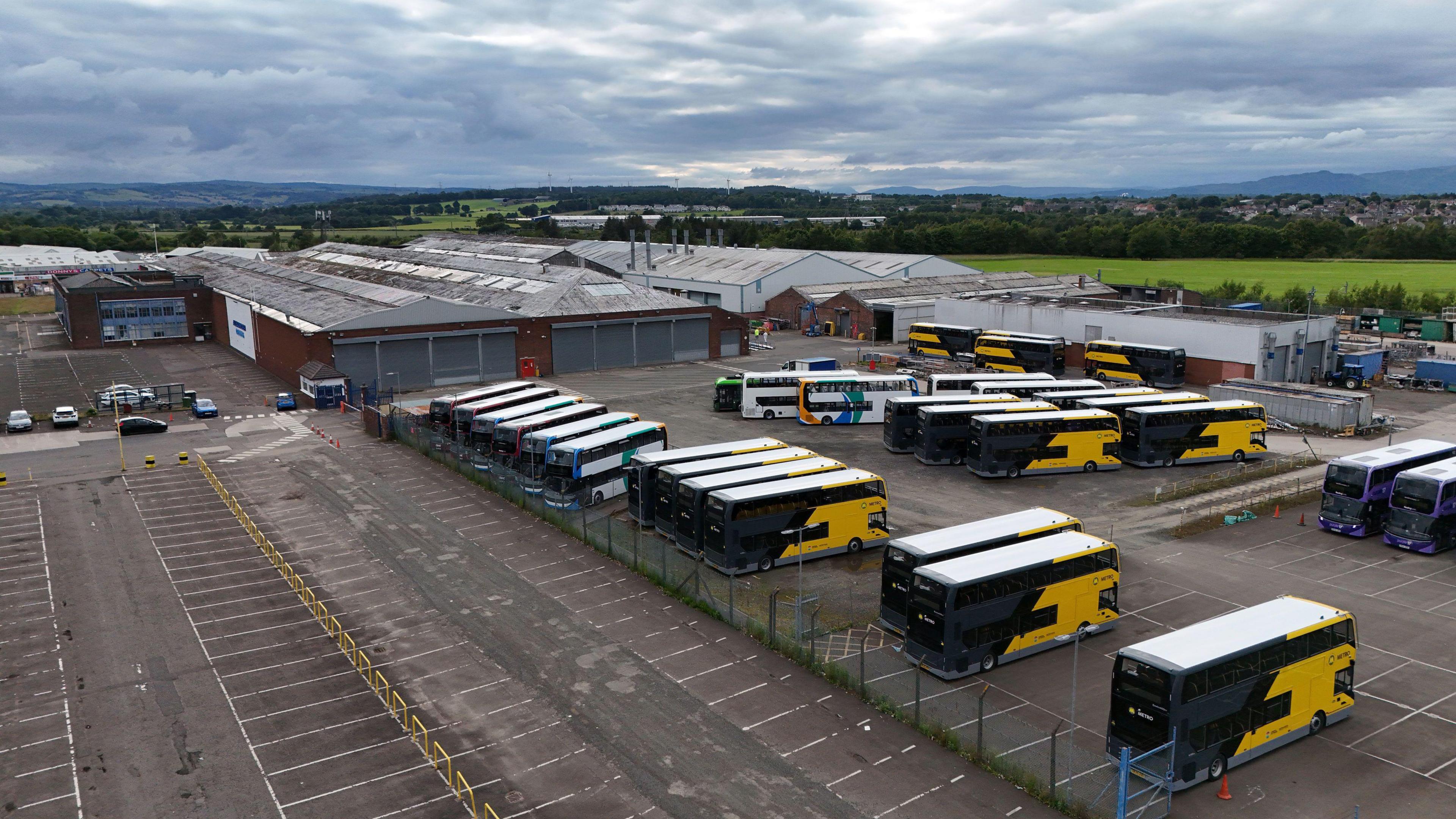Forbes 'optimistic' over Alexander Dennis bus deal

Kate Forbes said she was 'optimistic' a deal could be agreed
- Published
The Scottish government has said it is "optimistic" a deal to save jobs and bring new work to bus-maker Alexander Dennis can be agreed.
Deputy First Minister Kate Forbes said the firm had indicated a package put forward to retain 400 jobs at sites in Falkirk and Larbert would meet its requirements.
Alexander Dennis announced plans to consolidate its UK operations at a site in Scarborough, North Yorkshire, last month.
The Unite union urged all parties to act quickly to agree the deal in order to secure the future of the workforce.
First minister John Swinney confirmed his government was "actively exploring" a deal with the manufacturer on Monday.
Alexander Dennis extended a deadline for a consultation on the move until 15 August earlier this month.
Alexander Dennis extends deadline to save bus jobs
- Published2 July
Orders not enough to keep us in Scotland, says bus firm boss
- Published26 June
Forbes met the Unite and GMB unions on Monday to update them on the talks.
She said she was hopeful negotiations could progress to the next stage by the end of the week, but could not reveal any details due to commercial sensitivities.
Forbes said there was "work to be done" but that she was confident a deal could progress, subject to regulatory approval.
She said: "We are hoping there is a package there which Alexander Dennis have indicated would satisfy their requirements to retain the jobs and retain the sites.
"When I have discussed that with the unions and the company themselves, it is the one they feel most optimistic about.
"We are very conscious that we're two weeks before the consuiltation ends, but our hope is that consultation might be extended in order for us to work on potential solutions."

Alexander Dennis is proposing to axe 400 jobs at its Falkirk and Larbert sites
Forbes said she was "open to the idea" of a furlugh scheme for workers until the new agreement could be put in place.
The company's managing director, Paul Davies, told MSPs last month it would need to win contracts for 70 new buses this year and 300 next year to keep operations in Falkirk and Larbert running.
He said the Scarborough facility was capable of producing about 1,200 buses a year.
The job losses would come as a further bitter blow to the Falkirk area, which has already seen 400 jobs cut following the closure of the Grangemouth oil refinery.
'Time for action is now'
Swinney previously said he was "deeply concerned" by the cuts, but was criticised for his government's record on outsourcing bus manufacturing to China.
However he said ministers were placing the "utmost importance" in retaining "highly-skilled manufacturing" at the firm.
Derek Thomson, Scottish secretary of Unite, said the potential deal was an "important step forward".
He added: "The priority remains the protection of jobs and the long-term viability of manufacturing at Alexander Dennis' Scottish sites."
"The time for action is now. We urge all parties to act with urgency so that the workers and their families are provided with the necessary confidence over their futures.
"Unite will continue to work proactively with the Scottish government, UK government, Scottish Enterprise, and Alexander Dennis to ensure that any proposed package delivers immediate and sustainable outcomes."

The next few days will be crucial if there is to be any chance of saving the Falkirk and Larbert operations.
The company's consultation on the job losses runs until 15 August.
The Scottish government says it is unable to give more details publicly about its plan to try to save the jobs, citing commercial confidentiality, but the deputy first minister certainly sounds optimistic and hopeful.
Alexander Dennis is not simply looking for new orders.
It will need to be convinced that there will be enough work going forward to sustain the operations in both Scotland and Scarborough.
There is little point in extending the consultation period – or implementing a furlough scheme – unless there is a realistic prospect of saving the jobs and the Scottish plants. Otherwise they are merely delaying the inevitable.
Any solution is likely to be complex and involve the Scottish and UK governments, the unions and the company.
The company's response to the latest proposals will be crucial.